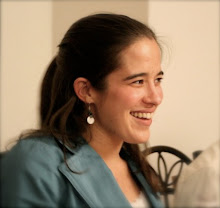I am amazingly finishing my two weeks on pediatrics in a few days. I've learned a lot (like how to read a pediatric chest X-ray) that I wonder how I didn't learn it before, and Dr. Thuma has been a great teacher (and very patient with my apparent inability to learn and remember how to do the seemingly endless calculations involved in pediatric drugs and fluid dosings). I've also seen many children with protein-energy malnutrition (PEM, or kwashiorkor), including one today who was 18 months and 7.8 kg (about 15 pounds) and another 12-month-old who was 4.5 kg (about nine pounds).
We also have a two-month-old baby in with PEM whose mother died two weeks ago. The family has been giving her cow milk because what else do you give a motherless baby when formula is either unavailable or unaffordable? In between desperately trying to remember why you're not supposed to give babies cow milk and wishing they could reasonably boil the bacteria-laden bottle and nipple, I wondered what realistic chance this little one had at a future with no mother and little access to nutritious food already at two months of age.
Mike and I gave powerpoint presentations earlier this week on acute rheumatic fever and rheumatic heart disease. He told me today that two of his patients on men's ward (age seven and up) with rheumatic heart disease died yesterday and today at around 14. There is no way for patients in this country to get valve replacements, which is what they would need to repair the damage done to their heart by untreated strep throat infections as children.
All it takes is some penicillin, the first antibiotic discovered years ago. But we almost never see sore throats in the outpatient department (I'm sure their parents have other things to worry about besides a little sore throat), and so some number of those untreated strep throat cases end up showing up a few years later in heart failure from damaged, leaky valves. Besides optimizing heart failure management, there's nothing we can do, and it sometimes feels like we can simply watch them die.
I feel that way with some of the really late-presenting, malnourished kids on peds, too. Sometimes it's just too late, and their immune systems are too far gone, and we can't intubate or ventilate anyone that might need it, and so some of them die. I haven't been there for any deaths yet, but I notice the empty beds.
One of the hardest things to face in medicine (at least for me) is finitude. I feel like I've mentioned this before, but I can't remember if it was in conversations only or in the blog, too, so bear with me if this is repetition. But I still have to grapple with the fact that I am finite. I can't learn it all, can't remember all the things I did at one time learn and know, can't save every life, can't impress or please everybody, can't know what is going on with all the patients I encounter or even sometimes make a diagnosis, can't make a difference in every life, can't pick up on every physical finding, etc., etc. It is daunting, and humbling. A resident-in-training once told me that he had grown to appreciate the fact that he could ask forgiveness of God both for sins of COmission (things he had done) and for sins of Omission (things he had left undone - forgotten, chosen to ignore, didn't know about). I am also growing in my appreciation of the fact that I do not have to carry the burden of either the things I do or that I do/can not do but can be free.
Subscribe to:
Post Comments (Atom)


I love reading your blog and looked through your pictures today, Amaris. What an incredible journey this has been and how much you are learning! Thank you for the lessons in humility today. I will continue to be praying for you guys! Love, Kristen
ReplyDeleteI remember Dan and other med students he was with talking about some similar issues. You're in my thoughts and prayers as you do your best with what you have.
ReplyDelete